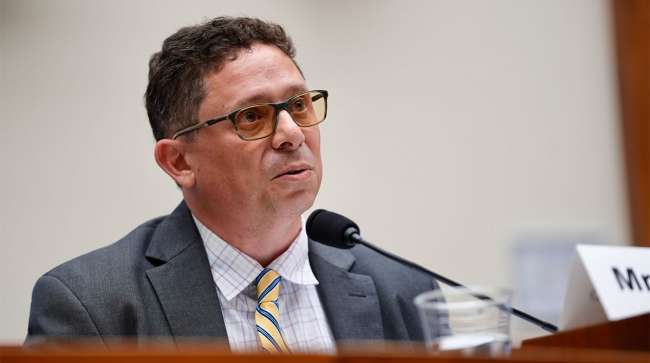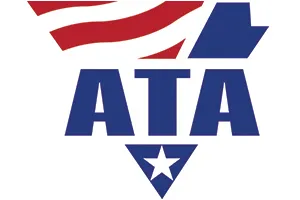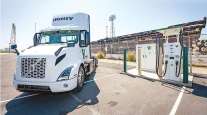Senior Reporter
Pitt Ohio Executive Targets EV Infrastructure

[Stay on top of transportation news: Get TTNews in your inbox.]
WASHINGTON — Ensuring electric commercial vehicles have reliable access to charging infrastructure remains a persistent challenge, a trucking executive recently told policymakers in the U.S. House of Representatives.
A day later, a group of lawmakers took steps to block the Biden administration’s directives on light- and medium-duty electric vehicles.
“After meticulous evaluation and planning with our truck manufacturer, we put into service our first battery-electric trucks,” Taki Darakos, vice president of vehicle maintenance and fleet services at Pitt Ohio, told the Highways and Transit Subcommittee April 30. “Although battery-electric trucks show promise in certain applications, they are not ready for broad deployment due to technology limitations.”
Representing American Trucking Associations at the House hearing, Darakos raised concerns about the Biden administration’s vehicle electrification strategy. If equipped with realistic timelines from regulators, Darakos told lawmakers the industry would have a better path for transitioning toward electrification.
“Pitt Ohio and our industry have demonstrated that we are wholeheartedly committed to reducing emissions. But it is important that we get this transition right,” Darakos explained. “Trucking is the backbone of our supply chain. Setting us up for failure will have dire consequences for our economy and American consumers.”
The Biden administration’s Joint Office of Energy and Transportation recently unveiled a road map to incrementally reduce emissions through 2040. Federal officials said they would rely on the strategy to advance the adoption of zero-emission Class 8 trucks. Additionally, in March the Environmental Protection Agency announced its Phase 3 emissions rule, which the industry argued sets unachievable adoption rates for battery-electric trucks and is a departure from a collaboration with regulators.
“Regrettably, EPA’s Phase 3 regulations released this year break from that history of successful partnership,” Darakos said. “This unworkable mandate ignores operational realities and places a costly burden on trucking companies.” In particular, the rule requires a range of certain electric vehicle sales.
The industry-backed Clean Freight Coalition criticized the EPA’s rule. “Utilities and the government will need to invest $370 billion to upgrade their networks and the power grid to meet the demands of the commercial vehicle industry alone, putting the price tag for an electric supply chain at nearly $1 trillion before one battery-electric commercial vehicle is purchased,” the group said. “Rather than mandating a new technology that carries with it exorbitant costs and operational concerns, policymakers should support lower carbon alternatives to diesel fuel that are currently commercially viable.”
Taki Darakos ATA Written Statement
A day after the House subcommittee hearing where Darakos testified, more than 100 congressional Republicans formally ramped up their opposition to the Biden administration’s efforts that aim to get more EVs on the road.
Sens. Pete Ricketts (R-Neb.) and Dan Sullivan (R-Alaska) and Reps. Russ Fulcher (R-Idaho) and John James (R-Mich.) helped lead a procedural measure known as a Congressional Review Act resolution that would pause a new federal emissions rule for light-duty and medium-duty vehicles. The EPA in April finalized a rule to drastically increase zero-emission vehicles in the marketplace by 2032.
“This rule will make it harder for low-income families to buy a car or rural families to get to their jobs. I promised Nebraskans I’d use every tool I have to fight this,” Ricketts said May 1.
James added, “I’ve always said, if you want an [electric vehicle], get an EV. But allowing the Biden administration to continue stifling consumer choice will only harm the American people.” Congressional leaders have yet to schedule votes on the measure.
ATA Applauds Politicians' Pushback
In a statement, ATA applauded the lawmakers’ aim at what the group called EPA’s unachievable objectives specific to battery-electric vehicles.

“The American Trucking Associations opposes EPA’s [greenhouse gas Phase 3] rule in its current form because the post-2030 targets remain entirely unachievable given the current state of zero-emission technology, the lack of charging infrastructure and restrictions on the power grid,” ATA Chief Advocacy and Public Affairs Officer Ed Gilroy said May 1. He said the lawmakers’ resolution “highlights the need for EPA to include the operational realities of trucking in their final regulation” and added that ATA is ready to work with Congress, industry and federal regulation to develop “realistic, technology-neutral national emissions standards that will benefit our environment and set our supply chain up for success.”
Relatedly, the industry continues to champion a repeal of a long-standing 12% excise tax on new trucks. Darakos called on policymakers to repeal the World War I-era tax, arguing it would facilitate the adoption of an upgraded fleet of commercial vehicles. As he put it, “The current 12% tax is the highest excise tax on any good and reduces our ability to invest in cleaner, safer equipment. This tax adds roughly $25,000 to the cost of a new clean-diesel tractor and can add $40,000 to $50,000 to the cost of a battery-electric or alternative fuel truck. This limits me every year when I am forced to buy 20 or 21 trucks instead of 25 newer, cleaner tractors.“
Check out Transport Topics' updated Top 100 list of the largest logistics companies in North America, and explore how the industry's top players have adapted to a tough freight market and are preparing for the future. Tune in above or by going to RoadSigns.ttnews.com.
Last year, transportation policymakers introduced the Modern, Clean and Safe Trucks Act of 2023. The legislation, which would repeal the excise tax, has yet to clear Congress for the president’s desk.
At the hearing, Republican leaders expressed concern about the administration’s directives targeting the commercial transportation sector. Highways and Transit Subcommittee Chairman Rick Crawford (R-Ark.) took aim at the timeline for transitioning to electric vehicles. His Republican colleagues emphasized difficulties regarding the extraction of minerals for realizing the technology.
“I’m not opposed to [electric vehicles]. I’m not opposed to any alternative energy vehicle. But the government shouldn’t try to control the market, and it shouldn’t stack the deck in favor of one vehicle over another. The fact is, EVs are sitting on car lots an average of 58 days longer compared to their conventional counterparts, and according to Kelley Blue Book, they cost at least $5,000 more,” Crawford said, adding: “Americans are hurting with runaway inflation thanks to this administration’s economic failures. I’m not sure they can afford an additional $5,000 for a vehicle they don’t really want and that doesn’t give them the reliability they need.” Kelley Blue Book is a vehicle valuation researcher.
Want more news? Listen to today's daily briefing above or go here for more info
Democrats for the most part applauded the Biden administration’s objectives related to electric vehicles, as many view cleaner or alternative fuel vehicles as tools for emissions reduction. “I know some have raised concerns about the pace at which these new programs are unfolding,” said Del. Eleanor Holmes Norton (D-D.C.), the subcommittee’s ranking member. “It is important to deploy chargers as quickly as possible to help spur the transition to clean vehicles. But it is also important to get these programs right — and I appreciate the Biden administration’s commitment to doing so.”
Pitt Ohio, based in Pittsburgh, ranks No. 60 on the Transport Topics Top 100 list of the largest for-hire carriers in North America.





